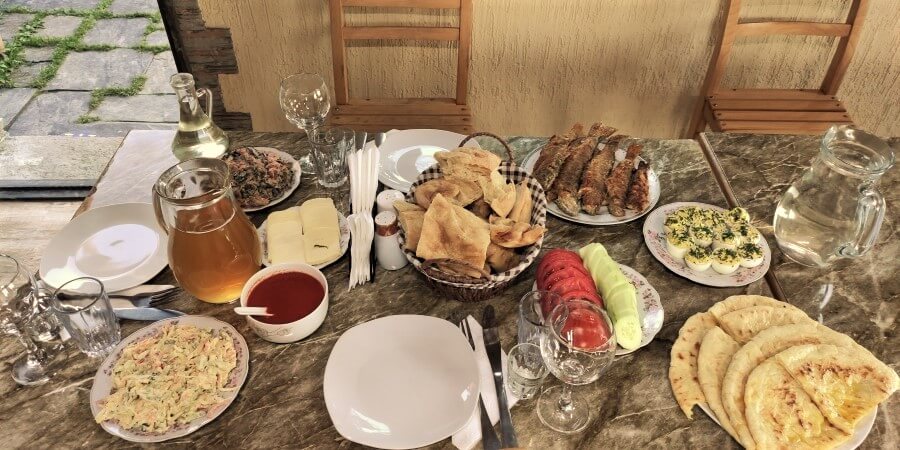Tushetian cuisine is a unique and important part of the region’s cultural heritage. It is based on local produce and traditional recipes that have been passed down through generations. Tushetian cuisine was traditionally based on products of sheep breeding and small (and little fertile) fields. Meat, milk, and derived products (whether from cows or sheep) are elemental. Here are some examples of Tushetian cuisine:
Local food
- ‘Gudis Kveli’ – salty Cheese maturing in sheep skin is one of the symbols of Tushetian cuisine. It was traditionally kept in bags made of inverted sheep skins, which imparted a specific flavor.
- ‘Matsoni’ – yogurt. Mostly, produced by shepherds in the mountains during the milking period.
- ‘Kotori’ – Cheese bread. They are shaped to symbolize the sun. They are filled with young salt-free cheese or curd, topped with clarified butter, and rank among the typical products of the local cuisine.
- ‘Khavitsi’ – curd mixed with clarified butter. When solid again, it becomes a great source of energy for shepherds in a form that can be stored and carried along.
- ‘Gordila’ – boiled bread. The dough is made into cubes and cooked. Corn flour is unleavened, while wheat flour is made with soda.
- ‘Tushetian Khinkali’ – dumplings filled with chopped meat. It has a thicker dough skin and may sometimes be filled with potatoes. Nevertheless, they are mostly prepared with beef or lamb, onion, herbs, and other seasonings.
Nearly all food is commonly seasoned with local herbs, forming a distinct character of the local cuisine. Coriander (kindzi) is the traditional essential ingredient in Georgia and Tusheti, whether picked in its natural habitat or grown in the gardens. As extras, people also have bites of other fresh herbs while eating their main course. Importantly, pickles are made through lactic acid fermentation in salt (e.g., fermented flowers of a scrub called ‘jonjoli’ – bladdernut originating in lowlands), popular are also sweet preserves.
Local drink:
- Araki – a kind of brandy. It is mostly made from distilled grape pomace (chacha). Nonetheless, distillation of cereals used to be more common. Grapes cultivated in Alvani are brought here, too.
- Aludi – Home-made beer is a festive drink traditionally made from mountain barley and wild hops. It is brewed for religious occasions in dedicated buildings where women in their period are not allowed.
Delicious are herbal infusions, above all those of mint (pitna) and wild thyme (kondara) sold in guest houses as the “Tusheti tea”.
In conclusion, Tushetian cuisine is known for its hearty and flavorful dishes, which reflect the region’s harsh climate and rugged terrain. It is a must-try for anyone visiting Tusheti.


















Comment (0)